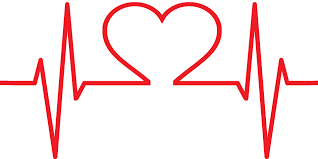
February is a month for hearts. You’ve no doubt seen all the red and pink hearts, roses, and chocolates in stores for Valentine’s Day. It’s also American Heart Health month, with a push by large societies such as the American Heart Association and National Heart, Lung, and Blood Institute for people to evaluate their risk for heart disease and concentrate on making lifestyle changes to promote heart health. Heart health is important, since heart disease is the leading cause of death among American men and women.
But did you know that making lifestyle changes to care for your heart also promotes gut health? Remember, heart disease is disease of the blood vessels supplying the heart. A heart attack is when one of those blood vessels becomes blocked, which blocks supply of blood to that area of the heart, and can cause heart tissue to die. Similarly, most strokes are caused by blockage of blood vessels to the brain, which means blood cannot get to that area of the brain and the brain tissue there can die.
Just like your heart and brain, all the organs in your gut have blood vessels which help keep them functioning properly. The blood brings nutrients and oxygen to your digestive organs and helps transport waste products away. A blockage in one of those vessels is a problem that can rival those caused by blockages in other areas of the body. And just like you’ve probably heard when it comes to heart disease or stroke, surgery or stents can be placed in the blood vessels feeding the gut to repair the problem, depending on its acuity.
Here are some suggestions for better blood vessel health, including those blood vessels which supply your heart, brain, gut, and everywhere else in the body.
- Check your blood pressure.
High blood pressure is called a “silent killer” because it doesn’t usually cause symptoms for people until it gets dangerously high. That’s why it’s important to have it tested. Every time you go to your primary care provider’s office, your blood pressure should be measured. If you want to measure it yourself, you can buy a blood pressure cuff at many pharmacies or grocery stores. High blood pressure is implicated in the development of heart disease, strokes, and kidney disease, among others.
- Quit smoking.
Smoking damages the lining of your arteries and veins. Once damaged, deposits can build up in the area, narrowing the vessel. A narrowed vessel leads to less life-giving blood to your organs.
- Listen for snoring.
What does snoring have to do with heart health? Snoring can be a sign you should be tested for a condition called obstructive sleep apnea, where you stop breathing many times during the night. When you stop breathing, oxygen levels in your blood drop, which causes your blood pressure to suddenly increase in an effort to maintain consistent oxygen levels in your body. This in turn causes strain on the vessels and the heart. Thus, sleep apnea is considered a risk factor for heart disease.
- Lose the weight.
Excess weight makes your heart work harder to get blood everywhere it needs to go. Obesity also promotes chronic inflammation throughout the body, another risk factor for disease to the heart and blood vessels.
- Give your heart a work out.
Exercise helps your heart become stronger, which means the blood gets to every part of your body more efficiently. Exercise also has a myriad of other benefits, including lifting mood, better self-esteem, and strengthening bones. When it comes to the digestive system, exercise can help keep your bowel movements regular.
Remember everything in your body is connected. So while you’re loving your heart this month, know you’re loving your gut, too.

Share This